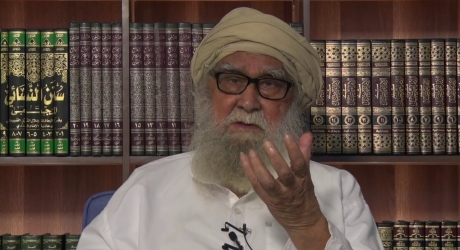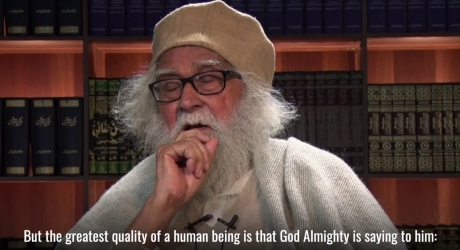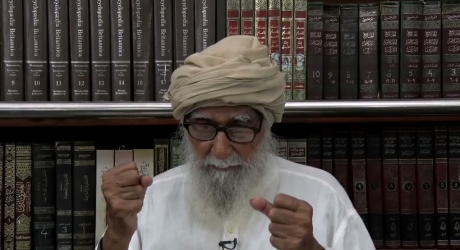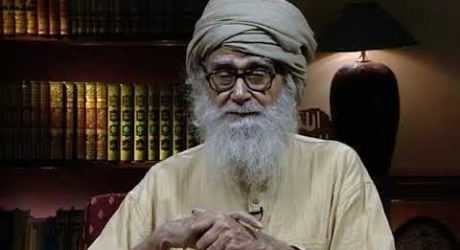Depression is a phenomenon of discontentment. Why does this phenomenon exist? The reason is that every person is born with an unlimited desire for enjoyment. However, everyone has a minimal capacity for fulfilment. It is this gap in human nature that makes people live in unrest. Is this phenomenon due to a defect in nature? Not at all. It is man’s unawareness of himself that creates this problem. Self-awareness is the key to a contented life, while unawareness leads to discontentment and restlessness. To explain this phenomenon in the right way, we have to discover the scheme of this world as devised by the Creator. According to the creation plan, the domain of fulfilment in the material world is minimal, while spiritual or intellectual fulfilment is so vast that words fail to express their endless boundaries. One who adopts the spiritual quest for his intellectual activities is a spiritual scientist. A physical scientist may stop at a certain point, but even the saying ‘sky is the limit’ becomes irrelevant for the spiritual scientist. Fulfilment through materialism is quite unachievable. Only spiritual pursuits can give you a sense of true fulfilment.
Mother Teresa was born in 1910, in Eastern Europe. She came to India as a teacher, and later started her mission, of serving the poor, for which she was awarded the Nobel Prize. She served a large number of people, over many decades. She became a model of humanity for many. She died in 1997. After that, a book was published, which shows her life to have been a very sad one. A story titled ‘Mother Teresa’s Crisis of Faith’, by David Van Biema, that appeared in the TIME magazine (August 23, 2007), provides revealing details of this book.
The TIME magazine article reveals that while Mother Teresa used to constantly talk of God and spirituality, she got neither. It tells us she spent almost 50 years of her life without sensing the presence of God. It reveals that Mother Teresa lived in extreme mental pain, in terrible despair. Why? Because she tried to find God, but was not able to. She had great longing for God, but still was unable to find Him.
Now, this is not something unique to Mother Teresa. What the TIME magazine described as Mother Teresa’s agony wasn’t her agony alone. It is the agony of humankind. Every person is living in the same predicament.
Many people do many things, thinking they will find God in this way, but it does not happen. And yet they conceal this. They keep it carefully hidden, as Mother Teresa did. Mother Teresa would say that whatever one does, one should do for the glory of God. Yet, all her life she never revealed publicly that she had searched for God in the poor but had not found Him there. It was only after her letters to some of her friends were published, after her death, that people came to know the truth. She did not attain the Truth, but she concealed this. She was such a famous lady. She led a public life of almost seven decades. But never did she ever publicly reveal that she had not found God, although she kept talking about Him. In every speech she would talk of God and spirituality. But inside, she was starving spiritually and intellectually. Yet, despite not finding God even after so much effort, she was not willing to try a new process. Why? Because you can try a new process only when you admit that you have not succeeded.
You might think you can get great happiness through earning a lot of money. But when you do earn a lot of money, you realise that you are still unhappy. The money has not brought you the happiness that you thought it would. And so, what should your response be? A wise response would be to reassess things, to admit that money has not got you happiness, and then to search for another means to acquire happiness, so that you do not die a failure. But if you do not reassess the method you have been using in the hope of getting happiness and if continue to use that same method, it isn’t likely that you are ever going to find happiness. If instead of engaging in reassessment, you publicly insist, “No, no! I am very happy”, while inside you are miserable, you are lying to yourself and to others.
I know so many people who are busy trying to earn as much money as they can. I ask them, “What do you get out of all this money?” And they say, “Oh, this money helps us buy so many things that make us happy.” But it’s all lies. Inside, they are all miserable.
Once, a woman came to meet me. I understood from her words that she was having problems with her marriage. I said to her, “It seems that you have some marital problem.” But she insisted, “No, no! We are very happily married.” After some time, however, she began to reveal the truth. She started to complain that her husband stayed out of the home much and spent very little time with her. She couldn’t get very far with her cover-up policy.
Everyone engages in this Operation Cover-Up. They are all trying to conceal their inner reality.
Suppose you think you will reach the Truth through social work, or through earning lots of money or by gaining political power. But in the end you discover that these paths do not take you to the desired destination. Then, what should you do?
One thing you must not do is to lie that you have reached the Truth when you have not. If you lie like this, how will you ever want to begin a new search for the Truth?
Why, as the TIME magazine story seems to suggest, did Mother Teresa live in a state of what can only be described as intellectual starvation, a state that not only she, but everyone else, lives in? It is because in each of us there is this urge to find the Truth. It is part of our very nature. Man is a Truth-seeking animal. To arrive at the Truth is man’s greatest longing. So, people try different routes in the hope of arriving at the Truth. If they conduct this search at the physical level, thinking that acquiring name, money and power and so on will help them arrive at the Truth, they are bound to be disappointed, sooner or later.
Why is this so? It is because the Truth is to be found not at the physical level, but at the intellectual level. If you live in intellectual starvation, how will you find the Truth?
So, your journey to the Truth must be a journey of intellectual discovery. For that, you need to study serious books, observe the world around you and yourself, and engage in intellectual exchange with others.
The first revelation to the Prophet of Islam was the word iqra, which means ‘read’. The Prophet, who at that time was in a cave, was instructed by God, through the Angel Gabriel, to read. The Prophet responded, saying that he could not read. Again Gabriel told him to read. The Prophet again said that he could not read. This happened three times.
What does this mean?
It means that even if you don’t know how to read, still you must read.
Here, the Quran gives us such an important message, although few people are aware of it. I’ve acted on this advice myself. Many years ago, I didn’t know English. One day, a friend of mine (who used to teach the Quran in a madrasa) saw me holding an English newspaper. He joked about this, saying, “You don’t understand English, and you are holding an English newspaper in your hand!”
So, what did I do? I didn’t know English, but still I learnt to read and speak it!
You have to focus on your intellectual development.
Besides reading serious books, you must contemplate on God’s creation—on the night and the day, on the many things you see on earth and in the sky. All of these things have lessons for you. They provide you with intellectual and spiritual food. This is invaluable for your intellectual development.
When a companion of the Prophet, Abu Dharr, died, a certain man rode from Basra to Madinah just to find out from his wife what the nature of her late husband’s worship had been. “He used to spend the whole day alone, engrossed in thought,” she told him. (Hilyat al-Awliya) If today someone said that thinking and contemplation are forms of worship, others may not agree with him at all! They may think worship consists only in the performance of a set of ritual actions or reciting a set of phrases.
One day a cart pulled by two oxen drove past Abu Darda, a companion of the Prophet. He watched as one of the oxen carried on pulling while the other stopped and sat down. The cart-driver began to beat the second oxen, and then it stood up and the cart began moving. Seeing this, Abu Darda remarked: “There is a lesson even in this. The one that stopped was whipped, while the other was left alone.” (Safawat al-Safawah) That is, he who abided by his duty was saved, and he who deviated from his duty was beaten. What a wonderful lesson is contained in this! In a worldly scene, the Companion remembered a fact about the Hereafter.
This shows the value of the sort of observation we need to engage in for our intellectual or spiritual development. Observation is to draw intellectual or spiritual lessons from the things we see around us in the world.
The Quran says that whenever Zachariah, the guardian of Mary, used to visit her, he would find provision with her. (3:37) Some people think this provision was some kind of out of season fruit that Zachariah used to find with Mary. However, this is a mysterious interpretation of this verse. Actually, what is meant here is spiritual or intellectual food. When Zachariah used to meet Mary, they would have deep conversations about God, about spirituality, about wisdom. Thus, the above Quranic verse means that Zachariah used to find spiritual provision with Mary every time he visited her.
So, we should seek spiritual or intellectual food from the world around us, which is always available in plenty. If you see things as you should, you will discover spiritual food in everything and in every experience.
You need also to engage in intellectual exchange with others. If you study or observe things alone, it will not suffice. When two stones are rubbed against each other, it produces a third thing—sparks or fire. Similarly, when two minds are rubbed against each other, a third thing—new ideas, new wisdom, new aspects of different issues—emerges.
God has given us, on a natural basis, intellectual partners, partners for intellectual exchange, which is vital for our intellectual or spiritual growth. These partners are members of our families. Everyone has been given many opportunities by God to learn from other people. In terms of learning opportunities, our families are Team 1, and other people are Team 2. Most people learn a lot from Team 2, but not from Team 1.
Why?
This is because with members of Team 1 you spend your time going on outings, talking about food and furniture, gossiping, squabbling and so on.
But that’s not what you ought to be doing. Team 1, the family, is a great blessing from God. You should have deep intellectual exchanges with them. Make every member of your family your intellectual partner.
But what do people do? Far from making their family members their intellectual partners, they never discuss intellectual issues with them. Instead, they take them out to the movies and to waste time window-shopping in malls. They spend much of the day working so that they can earn money to fulfill the material demands of their families. They work long hours so that they can fulfill their families’ desires for luxuries. They have no other purpose in life.
This is animalistic living.
Instead of wasting your life like this, make your family members your intellectual partners. Your conversations with them should be on religious topics, on scientific topics, on academic subjects, even on the dining table. God has blessed you with a natural group in the form of your family for your intellectual development. This is a very great blessing. What a great opportunity it is! God wants to make every home a school.
To make your family members your intellectual partners, there is a basic condition. And that is simple living. If you are not ready to adopt a simple way of life, you cannot have meaningful intellectual exchange on serious subjects with members of your family. Instead, you will talk about things like newer and bigger cars, food, marriage, clothes and all sorts of absurd topics that family folks, almost without exception (and including even so-called religious people), love to talk about. In this way, these people are losing an immensely valuable opportunity for their intellectual development.
The Quran says many things which people are not able to understand because they view these things in a mysterious light. They fail to understand many deep things mentioned in the Quran because they make these things seem very mysterious.
In the Quran, there is often a particular reference to something, but actually it has a general application. For example, Chapter al-Ahzab says in reference to Prophet’s family: “God seeks only to remove all impurity from you, and to make you completely pure.” (33:33) People say this verse refers to the superiority of the Ahl-e Bayt, the Prophet’s family. But actually a big thing is said here, and for all people—that you should purify your family and make them your intellectual partners and a blessing for you.
You contain much potential inside, but it cannot be fully unfolded without intellectual exchange with others. This is my daily experience. Every day, I learn through exchange. When two minds clash, a third thing emerges. This is what is called ‘development’.
There is one big taboo in Muslim institutions, and that is criticism. People get angry with me because I engage in criticism. In every Muslim madrasa, in every Muslim jamaat, criticism is taboo.
And do you know what the result of this is?
The result of this is disastrous intellectual stagnation.
If you try to ban criticism, you won’t succeed. All that will happen is intellectual stagnation. Without criticism, there is no intellectual development. Criticism does not mean abuse. It means scientific exchange, open discussion, so that you can share your opinions.
Once, I asked an American scholar the reason for America’s progress. He replied that the reason for America’s progress was that “Americans regard it as an inalienable right of people to dissent, to criticise each other.” Among present-day Muslims, however, dissent is taboo. Go to a mosque, a madrasa or any other Muslim institution and criticise anything, and immediately they say ‘a wrong person’ has come. One must have the courage to listen to dissent, to tolerate differences of opinion. But this is absent among present-day Muslims. This is one reason for their intellectual stagnation.
How can any progress happen if you are not willing to listen to alternate opinions? Everyone has been made by God. No devil has made the person who doesn’t think like you. Every person is ‘Mr. Nature’. That’s my starting-point. I do not consider any person to be bad by nature, because if I did, then I would think that God has committed an error in making him, which is simply not possible. When I believe that everyone is ‘Mr. Nature’, I think that the wrong things he might say are just on the surface, not the voice of his heart. I think that he has not been told the truth in a proper manner. He has not been given adequate reasons while explaining the truth.
This means that I entertain hope from every human being. I try to find out what is in his mind because of which he says or thinks in a particular way, and I want to address that. But do Muslims do this? Salman Rushdie wrote a book, and that created a furore. Taslima Nasreen wrote a book and the same thing happened. Some cartoons were published in Denmark and Muslims whipped up a terrible agitation.
One should try to understand the mind of people like Salman Rushdie and Taslima Nasreen. Try to understand why they think as they do. Then, make efforts to address these issues, to respond to them in the right manner. And if you respond in the right way, the Quran says, your enemy will become your friend. (41:34)
Just the other day, a friend of mine told me that someone used to say all sorts of things about me—that I am an ‘agent of the Hindus’, and so on. My friend asked his man if he had read anything written by me. The man said he had not. He had simply heard people saying things about me. My friend gave him a copy of a book I had written on the Prophet. The man read it and then came back to my friend, crying profusely. He said, “The man whom I had said such bad things about has written such a lovely book on the life of the Prophet.”
This is the right approach—reaching out, addressing and responding to people through intellectual means.
Try and study other people’s minds, their concerns. See where they are stuck and try to respond to them. And then they will become your friends and the problem of enmity will be over. But no! When Muslims get some news that agitates them, they whip up a massive protest.
What is the reason for this?
It is because of people’s very low intellectual level. They don’t understand things deeply. That’s why the three-point formula—of serious study; reflection on, and observation and contemplation of the world; and training your family so that they become your intellectual partners—is so important. Through this formula, you can grow intellectually or spiritually.
What I said about Mother Teresa—that she lived in intellectual starvation—this is the biggest problem, the biggest agony. It’s not just Mother Teresa’s story, though. It is everyone’s story. Everyone lives in intellectual starvation.
Why do people live in intellectual starvation?
It is because they do not consume intellectual food. They do not study. They do not contemplate. They do not engage in intellectual exchange.
The biggest help you can be of to someone is to help rescue him from intellectual starvation and to provide him intellectual food. This is the biggest blessing for people today. Today, the whole world is living in intellectual starvation.
This is the work to do today—to rescue people from the whirlpool of intellectual starvation, God willing.
Aqulu qawli haza wastaghfirullah li walakum ajmayeen (This is my statement, and I seek God’s forgiveness for myself and for you all)









